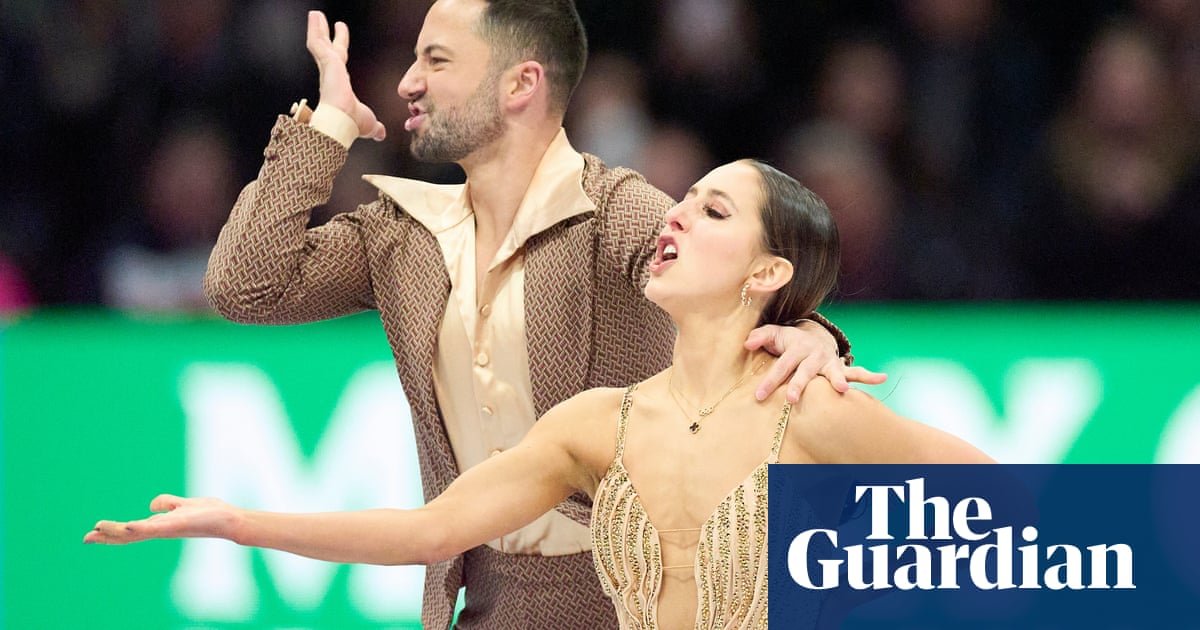Lilah Fear and Lewis Gibson moved a step closer to a breakthrough medal at the world figure skating championships on Friday, delivering a sharp, crowd-pleasing rhythm dance that put them third after the opening segment at TD Garden in Boston.
The British duo scored 83.86 points skating to their groove-drenched Nile Rodgers-Stevie Wonder medley, finishing behind only the two-time defending world champions, Madison Chock and Evan Bates of the United States, and Canada’s Piper Gilles and Paul Poirier. It is their highest position in a world championship segment and puts them in a podium place heading into Saturday’s free dance – just 0.82 points ahead of fourth-placed Charlene Guignard and Marco Fabbri of Italy.
No British ice dance team have reached the podium at a world championships or an Olympics since Jayne Torvill and Christopher Dean won bronze on their comeback at the 1994 Winter Games. After fourth-place finishes at the last two worlds, Fear and Gibson are now closer than ever to ending that three-decade hoodoo.
“I think today we had the most blast all season,” Fear said. “It was fantastic. It’s the way we want it. Of course, there are nerves. If there weren’t nerves, something probably would be wrong. But we had the most fun out there.”
The standard at the top was as formidable as expected. Chock and Bates posted the world’s highest rhythm dance score in two years – 90.18 points – with a smooth and technically secure routine set to a high-energy disco and retro rock medley blending Jive Bunny throwbacks with Bee Gees, the Jacksons and Donna Summer. Having won the last two titles after years of near misses, the Americans are looking to become the first team in 28 years to win three consecutive world titles, and the first Americans ever to do so.
Gilles and Poirier, silver medallists in Montreal last year, scored 86.44 to stay within striking distance. The Canadians beat Chock and Bates by half a point at February’s Four Continents Championships and are in position to challenge again.
Guignard and Fabbri, the reigning European champions, are making their 13th world championship appearance and remain contenders for the podium after taking bronze and silver in the past two seasons.
Fear and Gibson’s display follows a strong season that included Grand Prix wins in France and Finland and a bronze medal at the Grand Prix final, Britain’s first ever in the discipline. Their rhythm dance was one of the most charismatic of the afternoon, combining speed, musicality and a signature dose of theatrical flair that brought the crowd to its feet at the finish. On Saturday, they will perform their free dance to a Beyoncé medley, a bold and popular program that has earned ovations across the season.
“Maybe it seems from the outside that we had such a brilliant season, winning medals here and there,” Gibson said. “But actually, it was a quite challenging season for us. We had to do a lot of changes in the programs. There was my [practice accident] in Finland. So it wasn’t all easy, but these challenges made us grow and made us stronger.”
after newsletter promotion
With the competition tight and the arena expected to be near capacity on Saturday afternoon, they will have every chance to leave a lasting impression – and to make history.
Behind the top four, Canada’s Marjorie Lajoie and Zachary Lagha (81.77) took fifth ahead of a pair of American duos: Christina Carreira and Anthony Ponomarenko (81.51) and Caroline Green and Michael Parsons (77.51). Spain’s Olivia Smart and Tim Dieck (77.21) were eighth. But the medal picture appears increasingly clear. The other British duo Phebe Bekker and James Hernandez were 17th.
For now, the spotlight stays on the frontrunners. Chock and Bates are one strong performance from a historic third title. Gilles and Poirier remain in close pursuit. And for Fear and Gibson, the wait for a British breakthrough might finally be coming to an end.
